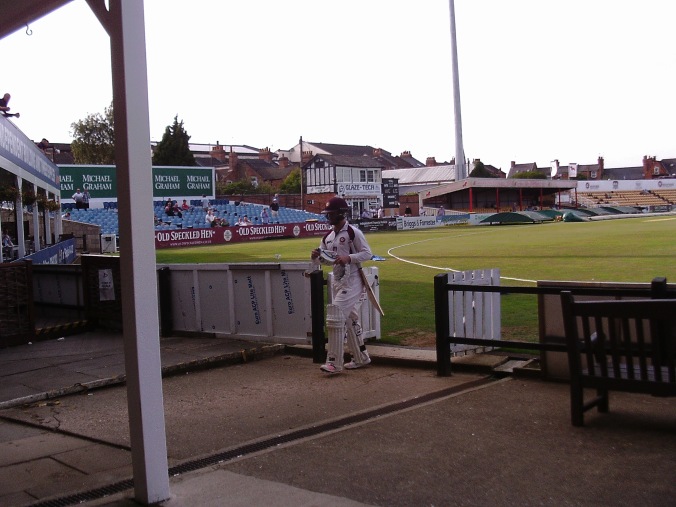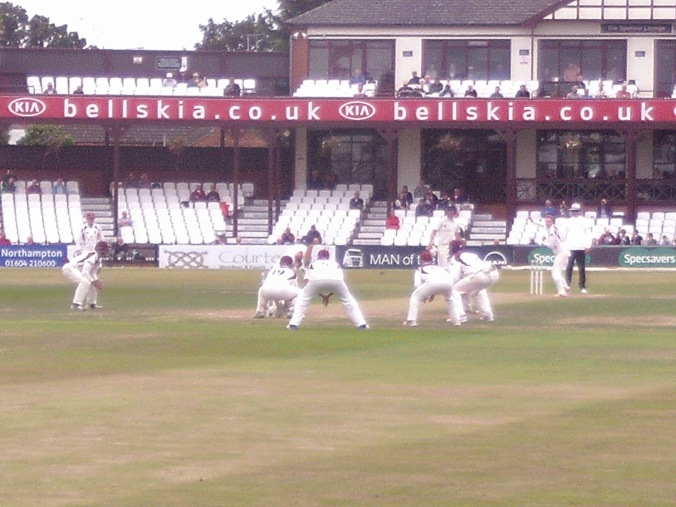Northamptonshire v Glamorgan, County Ground Northampton, County Championship, 31st August-3rd September 2016
“I don’t want to say I told you so …” is not a phrase that is often sincerely meant. Where cricket is concerned, though, it has an ambiguous force. On the one hand, it is only human to take pleasure in being able, retrospectively, to prove one’s perspicacity : on the other, predictability is a notorious kill-joy.
It depends a little, of course, on the nature of the prediction. If I had predicted, for instance, at the beginning of the 2013 season, that Leicestershire would not win another Championship game until 2015, it would have been cold comfort to have been proved right. Though there are some (particularly at Northampton) who, perversely, seem to take the opposite view, we generally prefer our optimistic prophecies to come true, and our more gloomy prognostications to be refuted.
I would, for instance, have expected this to be a predictable game, but I am delighted to say that I would have been quite wrong. I predicted early in the season that Northamptonshire would continue to produce dead, flat wickets and that most of their home games would be high-scoring draws, and I have been proved correct : all but one have been drawn. I also predicted that, if they wanted to win games, their best hope would be to return to their strategy of the 1950s, prepare turning pitches, and play at least two of their four spinners (this more a pious hope than a prediction).
Until the last ball before lunch, the match proceeded predictably enough. Northants were on 140-0, with Ben Duckett on 80 (and it is a sign of what an extraordinary player Duckett has become that I can describe making close to a century before lunch as predictable). He then tried to sweep a very full ball from a debutant, part-time off-spinner called Carlson off middle-and-leg, missed, and was bowled. This seemed likely to be only a temporary, if disappointing, interruption to their expected progress to a large total. In the afternoon, however, Carlson, who looked to be flighting the ball quite nicely, took 5 (mostly lower order) wickets for 25, and Owen Morgan, another inexperienced spinner, chipped in with 2-37, to dismiss Northants for 269.
This low total was dismissed as a predictable consequence of a hangover from the T20 victory and a depleted batting line-up, and Carlson’s figures as an amusing novelty. By lunch on the second day, however, Rob Keogh, generally seen as a batsman who bowls a bit, had taken 9-52 (the best bowling figures by a living Northamptonshire bowler) and Glamorgan were all out for 124. So hapless had the batsmen appeared that anxiety grew about a visit from the Pitch Inspector, so, at lunch time, most of the crowd wandered out to inspect it for themselves.
What they found was a pitch that was bare of grass, rutted where batsmen had scratched their marks, scuffed a little by bowlers’ footmarks (particularly the left-armer Wagg), but hard and solid looking (I didn’t dare poke it), and devoid of cracks. It was precisely the kind of wicket that you would hope to see in August, when spinners traditionally came into their own, but far too seldom do now. Still, however, the shadow of the Pitch Inspector and a points deduction hung over the ground, as Duckett and Newton walked out to bat.
Within an over or two, the shadow dispersed, along with the field, which soon came to resemble the closing overs of a Gillette Cup match in the days before fielding restrictions. It helped that Carlson (whose best day may already be behind him) bowled two full tosses to Duckett in his first over, both of which ended up in the groundsman’s hut (D’Oliveira had successfully employed the same tactic to dismiss him earlier in the season, but I don’t think Carlson was doing it deliberately). Duckett went on to make 50 off 30 balls and, in the course of a rare, golden afternoon, 185 off 159 balls, before a tired shot saw him return to a standing ovation and a pair of green wellingtons (whose meaning was obscure) balanced on the dressing room balcony.

On the third day Glamorgan, chasing a fanciful 451, again disintegrated (unlike the pitch), to Keogh (who took 4-73) and the precise, dandified left armers of Graeme White (6-44), both bowling with the rare luxury of a packed close field.

Glamorgan only slightly exceeded their first innings total, making 132, and were beaten by 318 runs, shortly before tea. In the course of the match Glamorgan had made 256 runs, Duckett 265. 31 of the 37 wickets to fall had fallen to spin, including all 20 of Glamorgan’s. Keogh finished with 13 wickets, and White 7.
To repeat myself, there was nothing freakishly venomous about this pitch, it was simply one that offered the spinners the help that they would once have taken as their due at this stage of this season (and in April at Northampton, if dear old Claude Woolley was on good form). If proper pitches like this became commonplace again, then only proper batsmen (or batsmen who play spin properly), like Duckett, would be able to make runs, and the flat track, “big” bat bullies would have to learn to adapt, to become better-rounded players.
Players like Keogh would have the incentive to become spinners who bat a bit, rather than vice-versa. Specialists like White might find themselves with a regular red ball gig, and a chance to express their full range of talents, rather than being reduced to mere, miserly, dot ball merchants in the T20. Young bowlers, whose careers are currently deformed (like that of Briggs), or at risk of being snuffed out altogether (like Riley’s), would stand a chance of reaching their potential peaks. England would, when preparing a squad to tour India, know who could play spin, and who was best capable of bowling it. They might even feel the need to employ a specialist wicket-keeper (such as David Murphy, whose swift and sure glovework played a significant part in White and Keogh’s success).
If all, or any, of that comes to pass, I shall be very pleasantly surprised. I shall also, unashamedly, take great pleasure in saying “I told you so”.

I’m sure Claude Woolley never drove one of these

